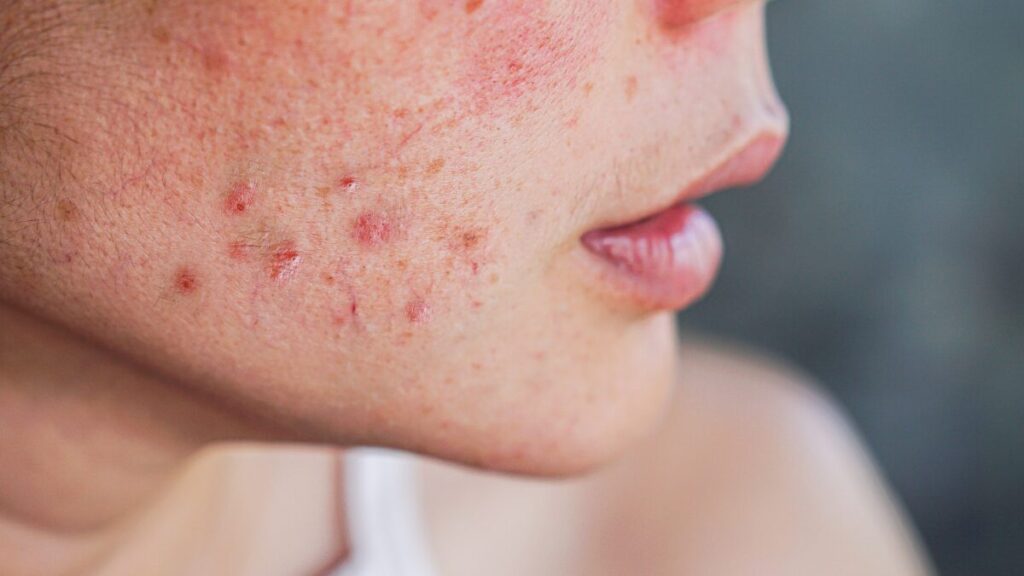
PCOS, short for Polycystic Ovary Syndrome, is an extremely common yet often misunderstood endocrine disorder affecting many women of reproductive age worldwide.
Some women suffer from it, some have never heard of it, and those who have heard of it may not fully understand what it is, or may even have it, since alarmingly, up to 70% of those affected around the globe are undiagnosed!
As September marks PCOS Awareness Month globally (symbolised by a beautiful teal ribbon), we are here to shed light on this condition to foster better understanding and support. The facts are that PCOS affects at least 1 in 10 women in the UK, that is over 3 million people, and an estimated 8 – 13% of reproductive-aged women internationally. This means that nearly 116 million women globally are affected by PCOS, making awareness and education crucial for improving diagnosis, management, and quality of life for those impacted.
Let us peel back all the layers of this PCOS onion and talk about it.
Getting Real About PCOS: What It Is And Why It Matters
In a nutshell, PCOS, pronounced P.C.O.S by some and Pee-Cos by others, is a hormonal disorder. Despite its name, which comes from the tiny cysts that can sometimes appear on the ovaries, do not be misled, as not all women with PCOS develop these cysts. In fact, PCOS is characterised by a range of signs and symptoms, so understanding this hormonal disorder in its entirety is key.
What is the exact cause of PCOS, you may ask? That remains a mystery. Think of it as a secret recipe with a dash of genetics (since PCOS may run in families) and a sprinkle of environmental factors. Additionally, many women with PCOS have insulin resistance, meaning their bodies produce more insulin than usual. This can contribute to hormonal imbalances and higher levels of androgens. Since insulin can interfere with ovulation, it leads to various symptoms one of which is PCOS itself.
The PCOS Symptoms You Need To Know About
Of course, PCOS symptoms can vary from individual to individual, but here is the lowdown on some typical PCOS symptoms to look out for:
- Missed Periods (Or None At All): Hormonal imbalances throw a wrench in the menstrual cycle, leading to irregular periods or sometimes no periods at all.
- Ovulatory Dysfunction: Trouble ovulating regularly? That is PCOS messing with your ovarian cycle, often making it harder to conceive.
- Excess Androgens: Elevated male hormones (androgens) can lead to unwanted guests like hirsutism (excess hair on the face and body), acne, and oily skin. Thanks, hormones!
- Polycystic Ovaries: Your ovaries might develop multiple small cysts, visible via ultrasound. But do not be fooled, cysts alone do not equal a PCOS diagnosis.
- Weight Gain: Struggling with weight gain or obesity? PCOS often makes it harder to keep the scale in check, which can worsen other symptoms.
- Insulin Resistance: Many women with PCOS have insulin resistance, making it tough for the body to handle glucose and raising the risk of type 2 diabetes.
- Thinning Hair: Hair thinning or male-pattern baldness can also crash the party, taking a toll on confidence and self-esteem.
PCOS Pitfalls: The Complications
Yes, the word “complications” always sounds a bit daunting, but by scheduling regular visits to your gynaecologist, you can help prevent serious issues from arising. This is especially important for PCOS, as it can lead to a range of problems if not managed properly, including:
- Infertility: Due to irregular ovulation, women with PCOS may face difficulties in conceiving. While PCOS is a leading cause of female infertility, many women with PCOS can still become pregnant with appropriate treatment and management.
- Type 2 Diabetes: Insulin resistance is common in PCOS, significantly increasing the risk of developing type 2 diabetes. Regular monitoring and lifestyle changes are essential to manage this risk.
- Cardiovascular Disease: Women with PCOS also have a higher risk of developing heart disease due to associated metabolic issues like high cholesterol and high blood pressure.
- Endometrial Cancer: Irregular menstrual cycles can lead to thickening of the endometrial lining, which may increase the risk of endometrial cancer. Regular screening and management are important for prevention.
- Sleep Apnea: You might not believe it, but PCOS can contribute to sleep apnea, a condition where breathing repeatedly stops and starts during sleep, often related to obesity.
How To Tackle The Symptoms And Take Control
Okay, breathe … while there is currently no cure for PCOS, there ARE various treatments available to manage symptoms and reduce the risk of complications.
Of course, the right treatment plan depends on your specific symptoms, especially whether you are looking to become pregnant.
- Lifestyle Modifications: Maintaining a healthy weight through a balanced diet and regular exercise is crucial. Even a small amount of weight loss can significantly improve insulin sensitivity and help regulate menstrual cycles.
- Medications: To manage PCOS, treatment options may include hormonal contraceptives such as birth control pills, patches, or rings. These can help balance menstrual cycles, lower androgen levels, and manage symptoms like acne and excessive hair growth. Another option is medication like Metformin, which is commonly used for insulin resistance; it improves insulin sensitivity and helps regulate periods. Alternatively, medications that reduce unwanted hair growth and clear up acne are also typically prescribed.
- Fertility Treatments: For those dealing with infertility, options such as ovulation-inducing medications or assisted reproductive technologies (like IVF) might be suggested.
- Hair Removal: Techniques such as laser hair removal or electrolysis can be highly effective for managing unwanted hair growth.
- Regular Monitoring: Consistent check-ups with healthcare providers are vital to keep an eye on and manage potential complications, including diabetes and cardiovascular issues.
Ever Wondered About Acne? PCOS And Acne Are Cousins!
PCOS and acne are like a tag team of trouble, thanks to some hormone hijinks. Those pesky elevated androgens (yes, the male hormones) are the culprits behind the excess sebum that turns your skin into an oil slick. Add insulin resistance into the mix, and you have got a recipe for acne mayhem since it just cranks up those androgen levels even more. Chronic inflammation from PCOS only adds fuel to the fire.
The fix? It is all about reining in those rogue hormones with a combination of medication and some trusty topical or aesthetic treatments. Tackling insulin resistance with a mix of smart eating and exercise can also work wonders. For the best results, it is highly advised to consult with a healthcare provider who can help craft a plan that is just right for you.

Our Closing Remarks
PCOS is a complex condition that requires a well-rounded management strategy, and PCOS Awareness Month shines a spotlight on the importance of early diagnosis and personalised treatment plans to help YOU live your best life.
By recognising the symptoms, complications, and treatment options, women with PCOS can now take charge of their health more effectively, like never before!
Naturally, ongoing research and education are key to deepening our understanding of PCOS and enhancing the quality of care for those affected. The future looks bright for managing this condition, allowing you to flaunt glowing skin, maintain a healthy weight, and even start a family.
Suffering from PCOS? Let us know in the comments what has helped you beat the PCOS struggle.


